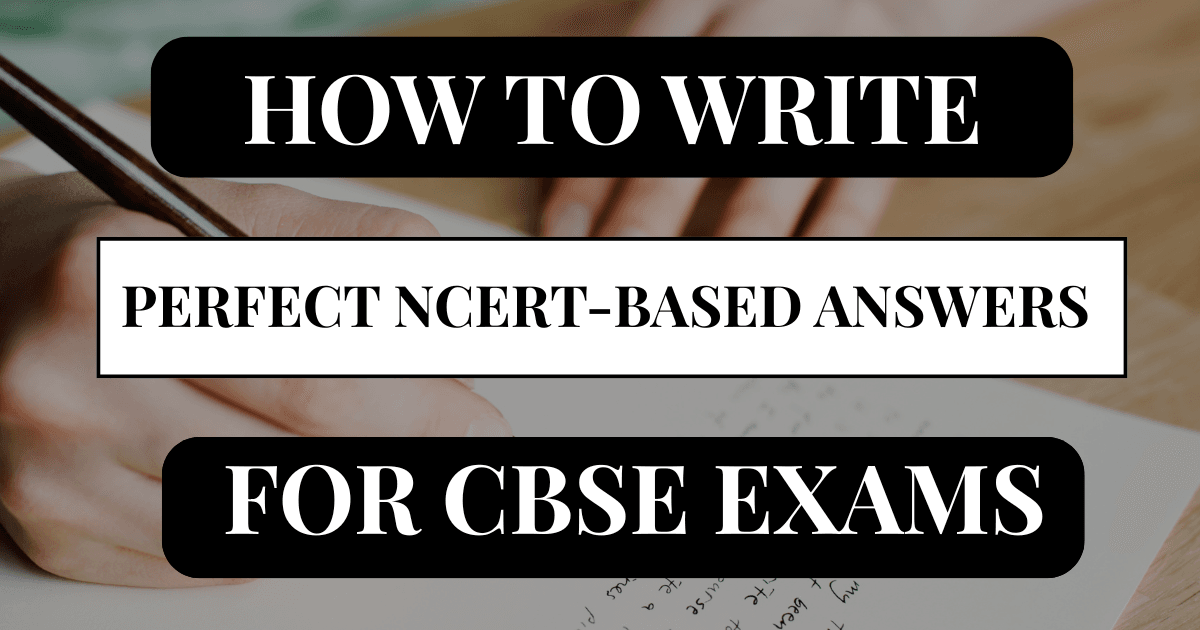When it comes to CBSE exams, one golden rule never changes: stick to NCERT. Year after year, CBSE toppers, teachers, and even board examiners highlight one thing: NCERT is your ultimate guide. But knowing the book isn’t enough; you need to master the art of writing answers based on the NCERT.
This blog will guide you step by step on how to write perfect NCERT-based answers so that you not only score better but also impress examiners with clarity and precision. From understanding the question to structuring your response and adding diagrams, we’ll cover everything that matters.
Why NCERT Matters in CBSE Exams
Before diving into answer-writing techniques, let’s quickly understand why NCERT is the backbone of CBSE:
- Most questions come directly or indirectly from the NCERT. Even higher-order thinking questions are often based on its concepts.
- Precise definitions, terms, and examples in the NCERT are examiner-friendly.
- Official CBSE sample papers and marking schemes revolve around NCERT content.
So, if you want full marks, NCERT isn’t optional; it’s essential.
Writing Perfect NCERT-Based Answers for CBSE Exams
Whether you’re preparing for Class 10 or Class 12, these tips will help you write answers that match CBSE’s marking style and boost your overall performance.
Step 1: Understand the Question Carefully
Many students lose marks not because they don’t know the answer, but because they misread the question. Here’s what you can do:
- Identify the demand: Is it asking you to explain, list, justify, or differentiate?
- Look for keywords: Terms like define, elaborate, distinguish, with example, guide the structure.
Check marks allotted: A 1-mark answer should be precise, while a 5-mark answer needs elaboration with examples and points.
Tip: Underline or circle keywords in the question paper during reading time.
Step 2: Begin with the NCERT Language
Examiners love NCERT’s phrasing because it’s accurate and standard.
- Use the exact definition from NCERT wherever possible.
- For science and social science, start with a crisp NCERT statement and then expand.
- Avoid writing in a casual or “own language” style unless it’s an application-based question.
Example: If the question is “Define photosynthesis,” begin exactly as NCERT defines it, and then add examples or diagrams if marks demand.
Step 3: Structure Your Answer Properly
A well-structured answer shows clarity of thought. Follow this pattern:
- Introduction (Definition/Concept): Start with the NCERT definition or main idea.
- Body (Explanation/Points): Write in points or short paragraphs.
- Use bullet points or numbering for better readability.
- Include diagrams, flowcharts, or tables when relevant.
- Conclusion (Summary/Example): Wrap up with an example, case study, or final line to complete the answer.
Tip: For long answers, always leave line spacing between points. It makes your answer sheet look neat.
Step 4: Use Diagrams and Flowcharts
Visuals speak louder than words, especially in science, geography, and economics.
- Draw neat, labeled diagrams with a pencil (never a pen).
- Underline labels.
- Even if not asked, a diagram can fetch you extra marks.
Example: In Biology, a diagram of the human heart or digestive system instantly makes your answer stand out.
Step 5: Write to the Point
Avoid the temptation to overwrite. Examiners have limited time; they appreciate concise, precise answers.
- Stick to the word limit mentioned in the paper.
- Avoid stories or unnecessary repetition.
- Highlight important terms by underlining.
Tip: For 2–3 mark questions, use 2–3 bullet points. For 5-mark questions, 5–6 bullet points are enough.
Step 6: Use NCERT Examples and Data
Whenever possible, add the examples or case studies mentioned in the NCERT.
- In Social Science, quote data from the NCERT tables.
- In Science, mention experiments or examples directly from the book.
- In Literature, use NCERT’s exact quotes or references while explaining answers.
This shows the examiner that your preparation is rooted in the prescribed book.
Step 7: Manage Time While Answering
Even if you know everything, poor time management can spoil your paper.
- Divide time: Assign time according to marks (e.g., 1 mark = 1–2 minutes).
- Attempt easy questions first: Build confidence and save time for long answers later.
- Keep 10–15 minutes at the end for revision.
Tip: Practice writing NCERT-based answers with a timer before exams.
Step 8: Presentation is Key
Your knowledge matters, but presentation decides the impression.
- Write in legible handwriting.
- Use headings and subheadings in long answers.
- Underline keywords with a ruler.
- Leave margins on both sides for neatness.
A well-presented paper automatically appeals to examiners.
Step 9: Practice Previous Years’ Papers
NCERT-based writing can be mastered only through practice.
- Solve previous years’ CBSE papers.
- Check marking schemes to understand how examiners expect answers.
- Compare your answers with the toppers’ answer sheets available online.
This helps you align your writing style with CBSE standards.
| Related Posts |
| Class 10 PYQs with Solutions |
| Class 10 Sample Papers with Solutions |
| Class 12 PYQs with Solutions |
| Class 12 Sample Papers with Solutions |
| Class 11 Important Questions & Answers |
Step 10: Revise Smartly Before Exams
In the last few days, focus only on the NCERT.
- Revise definitions, formulas, diagrams, and examples.
- Highlight or mark important NCERT lines for quick revision.
- Don’t start new reference books at the last moment.
Also See: NCERT Underlined PDFs
Final Thoughts
Scoring high in CBSE exams isn’t about writing long answers or showing off extra knowledge. It’s about writing clear, precise, and NCERT-based answers that examiners can quickly evaluate.
If you stick to NCERT language, structure your answers neatly, add diagrams and keywords, and, practice regularly, then writing perfect NCERT-based answers will become your biggest strength in exams.
Remember, CBSE doesn’t reward how much you write; it rewards how correctly and effectively you present NCERT knowledge.





